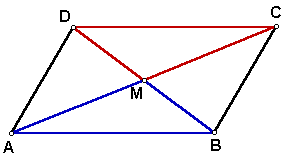"The diagonals
of a parallelogram are bisect each other."
A Proof Outline
Using
Geometer's Sketchpad
by David Wise
Note: I recommend that this page be printed out, so that the
instructions are easier to follow.
In order to successfully complete a proof,
it is important to think of the definition and the construction
of a parallelogram.
In the following outline, I will provide the statements, you
provide the reasons.
Prove: If a quadrilateral is a parallelogram,
then the diagonals bisect each other.
Given: Parallelogram ABCD with diagonals BD
and AC intersecting at point M.

Prove: Segment AC and BD bisect
each other.
- Consider how a parallelogram is constructed------parallel
lines.
- Consider properties of parallel lines and
vertical angles.
- The diagonals create 4 triangles.
- Consider triangle congruency properties.

- Click here to investigate this sketch to help with the steps
of the proof.
Proof:
- Angle DBA is congruent to angle BDC.
- Angle CMD is congruent to angle AMB.
- Triangle CMD is congruent to triangle AMB.
- Segment AM is congruent to segment MC.
- M is the midpoint of segment AC.
- Segment BD bisects segment AC.
- Segment BM is congruent to segment MD.
- M is the midpoint of segment BD.
- Segment AC bisects segment BD.
Extension:
- Transform the two-column
proof into a paragraph proof.
- Find an alternative way to
prove that the diagonals of a parallelogram bisect each other.
If you have any questions while trying to complete this investigation,
or suggestions that would be useful, especially for use at the
high school level, please send e-mail to esiwdivad@yahoo.com.
Return to
the Table of Contents.


